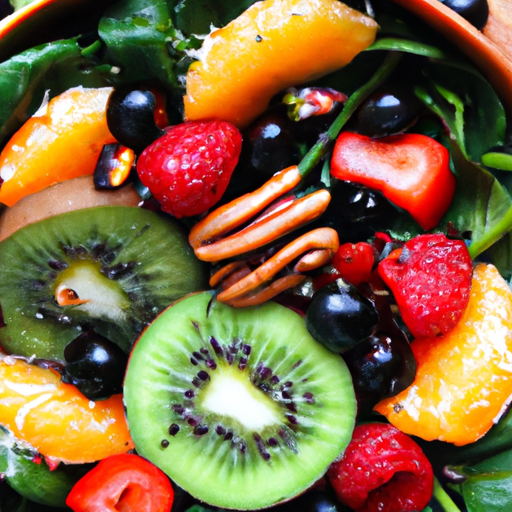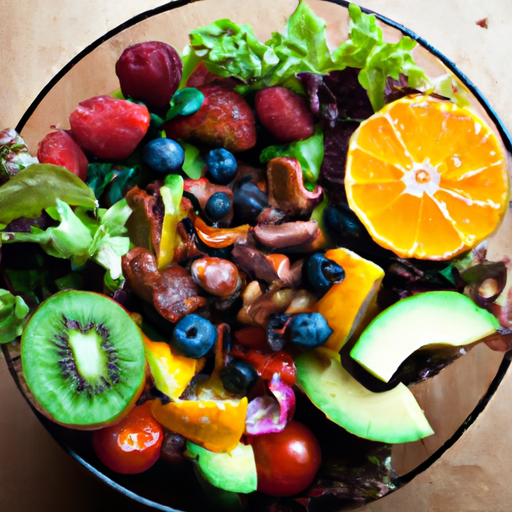Feeling a little down or lacking energy? Look no further than your own kitchen for a mood boost! In this article, you will discover how certain foods can have a positive impact on your mood and overall well-being. From incorporating mood-boosting nutrients to making simple dietary changes, you’ll find easy and effective ways to enhance your mood through nutrition. Say goodbye to those gloomy days and say hello to a happier you!
Understanding the Connection Between Mood and Nutrition
The role of nutrition in mental health
When it comes to our overall well-being, we often overlook the significant impact that nutrition can have on our mental health. The food we consume plays a crucial role in regulating our moods and emotions. While many factors can influence our mental state, such as stress and genetics, the nutrients we provide our bodies through our diet can make a substantial difference in our mood regulation.
How food affects serotonin levels
Serotonin is a neurotransmitter responsible for regulating our moods, promoting feelings of happiness, and improving our overall well-being. Interestingly, approximately 90% of serotonin is produced in our intestines. This means that the food we consume directly impacts serotonin production.
Consuming foods rich in tryptophan, an essential amino acid, can increase serotonin levels. Foods such as turkey, salmon, nuts, seeds, and bananas are excellent sources of tryptophan. By incorporating these into your diet, you can effectively boost your serotonin levels and improve your mood.
Gut-brain axis: The impact on mood
You may be surprised to learn that our gut and brain are interconnected through a complex network known as the gut-brain axis. This connection highlights the crucial role that gut health plays in mood regulation. The state of our gut directly affects our mental and emotional well-being.
Research has shown that imbalances in gut bacteria, known as dysbiosis, can lead to mood disorders such as depression and anxiety. By maintaining a healthy gut microbiome through proper nutrition, we can positively influence our mood and mental health.
Nutrients Essential For Mood-Boosting
Vitamins B6 and B12: Their role in mood regulation
Vitamins B6 and B12 are essential for the synthesis of neurotransmitters that regulate our moods, such as serotonin and dopamine. These vitamins help maintain the proper functioning of the nervous system and promote healthy brain function.
Foods rich in vitamin B6 include poultry, fish, bananas, spinach, and chickpeas. Vitamin B12 can be found in animal products such as meat, fish, eggs, and dairy. Ensuring an adequate intake of these vitamins can have a positive impact on your mood.
The importance of Vitamin D
Vitamin D, often referred to as the sunshine vitamin, plays a crucial role in regulating our mood. It helps regulate serotonin production and has been linked to lower rates of depression. Unfortunately, many people may be deficient in vitamin D, especially during the winter months or in areas with limited sunlight.
To increase your vitamin D levels naturally, spend time outdoors in the sunlight and consume foods such as fatty fish (salmon, mackerel), fortified dairy products, and eggs. If necessary, you can also consider taking a vitamin D supplement to ensure optimal levels.
Omega-3 fatty acids and mental well-being
Omega-3 fatty acids are essential fats that are critical for brain health and mood regulation. They help reduce inflammation in the brain and can improve symptoms of depression and anxiety.
Fatty fish, such as salmon, mackerel, and sardines, are excellent sources of omega-3 fatty acids. If you’re vegetarian or vegan, you can obtain omega-3s from plant-based sources like flaxseeds, chia seeds, and walnuts.
Minerals for Mood: Magnesium and Zinc
Magnesium and zinc are two minerals that are often overlooked but play a crucial role in maintaining a balanced mood.
Magnesium acts as a natural relaxant and helps regulate stress hormone levels. It can be found in foods such as leafy greens, nuts, seeds, and whole grains. Zinc, on the other hand, is involved in the metabolism of neurotransmitters. It can be obtained from foods like oysters, beef, chicken, nuts, and seeds.
By incorporating these minerals into your diet, you can support mood stability and overall mental well-being.

Foods to Include in Your Mood-Boosting Diet
Fruits and vegetables
fruits and vegetables should form the foundation of any mood-boosting diet. These nutrient-dense foods are rich in vitamins, minerals, and antioxidants that support brain health and promote a positive mood.
Leafy greens like spinach and kale provide essential vitamins and minerals. Fruits like berries, oranges, and bananas contain mood-boosting antioxidants and other beneficial compounds.
Whole grains
Whole grain foods are an excellent source of complex carbohydrates that provide a steady release of energy throughout the day. They help stabilize blood sugar levels and prevent energy crashes that can negatively impact mood.
Choose whole grain options like brown rice, whole wheat bread, and quinoa. These foods also contain important nutrients like magnesium, which further support mood regulation.
Fatty fish rich in Omega-3
Incorporating fatty fish into your diet can provide a significant dose of omega-3 fatty acids. These healthy fats promote brain health, reduce inflammation, and support optimal mood.
Include fish like salmon, mackerel, and sardines in your meals at least twice a week. If you’re not a fan of fish, consider adding a high-quality fish oil supplement to your daily routine.
Legumes, nuts, and seeds
Legumes, nuts, and seeds are valuable sources of plant-based proteins, fiber, and essential nutrients. They provide a wide range of vitamins and minerals that support brain health and contribute to overall mood regulation.
Incorporate foods like lentils, chickpeas, almonds, walnuts, flaxseeds, and chia seeds into your diet. These options are not only delicious but also contribute to a balanced mood and improved mental well-being.
Foods to Avoid in Your Mood-Boosting Diet
Refined sugars and simple carbohydrates
Refined sugars and simple carbohydrates can cause drastic fluctuations in blood sugar levels. This results in cravings, energy crashes, and mood swings. These foods provide a temporary surge of energy but ultimately leave you feeling drained and irritable.
avoid sugary snacks, soda, and processed foods made with white flour. Opt for whole, unprocessed foods that provide sustained energy and stability in your mood.
Processed foods and trans fats
Processed foods, high in unhealthy trans fats, can contribute to inflammation in the body and negatively impact brain health. These fats have been linked to an increased risk of depression and other mood disorders.
Avoid fried foods, fast food, and packaged snacks that are high in trans fats. Instead, prioritize whole, unprocessed foods cooked in healthy oils like olive or avocado oil.
Food additives and artificial sweeteners
Food additives and artificial sweeteners can have adverse effects on mood and mental well-being. These additives can cause migraines, anxiety, and even trigger depressive symptoms in some individuals.
Read food labels carefully and avoid foods with artificial sweeteners, food colorings, and other additives. Opt for natural, whole foods that don’t contain these unnecessary additives.

Debunking Myths about Mood and Food
The sugar high myth
Contrary to popular belief, consuming excessive sugar does not provide a sustained boost in mood. While sugary foods can briefly increase dopamine levels and provide a temporary feeling of happiness, the crash that follows can leave you feeling worse than before.
It’s essential to prioritize whole, unprocessed foods that provide long-lasting energy and promote stable moods.
The myth about coffee and mood enhancement
Many people rely on coffee to boost their mood and energy levels. While the caffeine in coffee can temporarily increase alertness, excessive intake can lead to mood swings, increased anxiety, and disrupted sleep patterns.
Moderate coffee consumption and opting for herbal teas or decaffeinated alternatives can help avoid the negative side effects of excessive caffeine intake.
Busting the myth about ‘comfort food’
Comfort food is often associated with mood enhancement and feelings of comfort. However, these high-calorie, indulgent foods can provide temporary relief but ultimately contribute to negative mood swings and guilt.
Instead of relying on comfort foods, focus on nutrient-dense options that nourish your body and provide sustainable energy without compromising your mood.
The Role of Hydration in Mood Regulation
How dehydration affects mood
Dehydration can have a significant impact on our mood and cognitive function. Even mild dehydration can lead to feelings of fatigue, irritability, and difficulty concentrating.
Make sure to drink enough water throughout the day to stay properly hydrated. It’s essential to listen to your body’s signals and consume water when you feel thirsty.
The optimal amount of water intake
The amount of water you need to drink daily varies based on factors such as age, sex, activity level, and climate. As a general guideline, aim to drink at least eight cups (64 ounces) of water per day. However, individual needs may vary, so it’s essential to pay attention to your body’s hydration needs.
Remember that factors such as exercise or hot weather may increase your hydration requirements. Carry a water bottle with you as a reminder to drink water regularly throughout the day.
Hydrating food and drink choices
In addition to drinking water, you can also increase your hydration through certain foods and beverages. Fruits and vegetables with high water content, such as watermelon, cucumbers, and strawberries, can contribute to your overall hydration.
Drink herbal teas or infused water for added flavor while ensuring proper hydration. Avoid excessive consumption of sugary or caffeinated beverages, as they can dehydrate you further.

Incorporating Probiotics for Gut and Mood Health
The role of gut health in mood regulation
Emerging research has shown a significant connection between gut health and mood regulation. Our gut is home to trillions of bacteria that contribute to various aspects of our physical and mental health.
An imbalanced gut microbiome, known as dysbiosis, can contribute to mood disorders such as depression and anxiety. By maintaining a healthy gut environment, we can support our overall mental well-being.
Probiotic-rich foods
Probiotics are beneficial bacteria that can help restore balance in our gut microbiome. Including probiotic-rich foods in your diet can provide a natural source of these beneficial bacteria.
Foods like yogurt, kefir, sauerkraut, kimchi, and pickles contain live cultures that can support gut and mood health. Incorporating these foods into your diet can have a positive impact on your mental well-being.
The use of probiotic supplements
If you have difficulty obtaining enough probiotics from food sources, you may consider taking a probiotic supplement. Probiotic supplements come in various strains and strengths, so it’s essential to choose one that suits your specific needs.
Consulting with a healthcare professional or registered dietitian can help determine the appropriate probiotic supplement for you. They can also provide guidance on optimal dosage and duration of use.
Meal Planning and Prepping for Mood Improvement
Balancing macronutrients
Balancing macronutrients – carbohydrates, proteins, and fats – in your meals plays a crucial role in stabilizing your mood and ensuring adequate nutrient intake.
Include a source of lean protein like chicken, tofu, or lentils in each meal. Pair it with whole grains like brown rice or quinoa and incorporate healthy fats from sources such as avocado, nuts, or olive oil. This balanced approach to macronutrients will provide sustained energy and support mood stability throughout the day.
Ensuring adequate nutrient intake
When planning your meals, ensuring adequate nutrient intake is essential for optimal mood regulation. Incorporate a variety of fruits, vegetables, whole grains, and lean proteins to provide your body with the necessary vitamins, minerals, and antioxidants it needs.
By following a well-rounded and nutritious meal plan, you can support your mental well-being and improve your mood over time.
The importance of regular meals
Maintaining a regular meal schedule is crucial for stabilizing blood sugar levels and avoiding energy crashes that can impact your mood.
Plan and prepare your meals in advance, ensuring you have healthy options available throughout the day. Aim to eat every few hours to keep your blood sugar levels stable and prevent any extreme fluctuations that can negatively affect your mood.

The Impact of Snacking on Mood
Healthy snack options
Snacking can play a significant role in maintaining stable blood sugar levels and supporting your mood throughout the day. Opt for healthy snack options that provide a combination of carbohydrates, protein, and healthy fats.
Some examples of healthy snacks include Greek yogurt with berries, carrot sticks with hummus, nuts and seeds, or a small handful of dark chocolate. These options provide sustained energy and essential nutrients without causing drastic blood sugar fluctuations.
The role of snacks in blood sugar regulation
Snacks can help regulate blood sugar levels by providing a consistent source of energy between meals. When you go too long without eating, your blood sugar levels can drop, leading to feelings of irritability and fatigue.
Choosing balanced snacks that contain a combination of carbohydrates, protein, and fats can help stabilize blood sugar levels and prevent mood swings throughout the day.
Avoiding mood swings through mindful snacking
Mindful snacking involves being aware of your body’s hunger and satiety cues and making conscious choices about what and when to eat. It’s a way to avoid mindless snacking and prevent mood swings caused by excessive sugar or unhealthy snack foods.
Listen to your body’s signals and pay attention to how certain foods make you feel. Opt for nutrient-dense snacks that provide sustained energy and nourishment, ultimately supporting your overall mood and well-being.
Seeking Professional Help for Mood Disorders
When to seek help from a dietitian
While nutrition plays a significant role in mood regulation, it’s essential to seek help from a registered dietitian or healthcare professional if you’re experiencing persistent mood disorders.
If you find that despite making dietary changes, your mood remains unstable or worsens, it may be time to seek professional guidance. A dietitian can assess your unique needs, identify any underlying nutrient deficiencies, and work with you to develop a personalized nutrition plan that supports your mental well-being.
Mental health resources
In addition to seeking help from a dietitian, it’s crucial to access mental health resources for support. Mental health professionals, such as therapists or counselors, can provide guidance, therapy, and tools to help manage mood disorders effectively.
There are also various support groups and online communities that offer understanding and a sense of belonging to individuals struggling with mood disorders. Remember, you are not alone, and reaching out for help is a sign of strength.
The role of medication and therapy in mood disorders
In some cases, medication and therapy may be necessary to manage mood disorders effectively. If your symptoms are severe or significantly impacting your daily life, it’s essential to collaborate with a healthcare professional to determine the most appropriate treatment plan.
Medication can help regulate brain chemistry, while therapy can provide valuable tools and support to manage mood disorders. By combining proper nutrition, professional help, and self-care strategies, you can work towards achieving optimal mental and emotional well-being.


